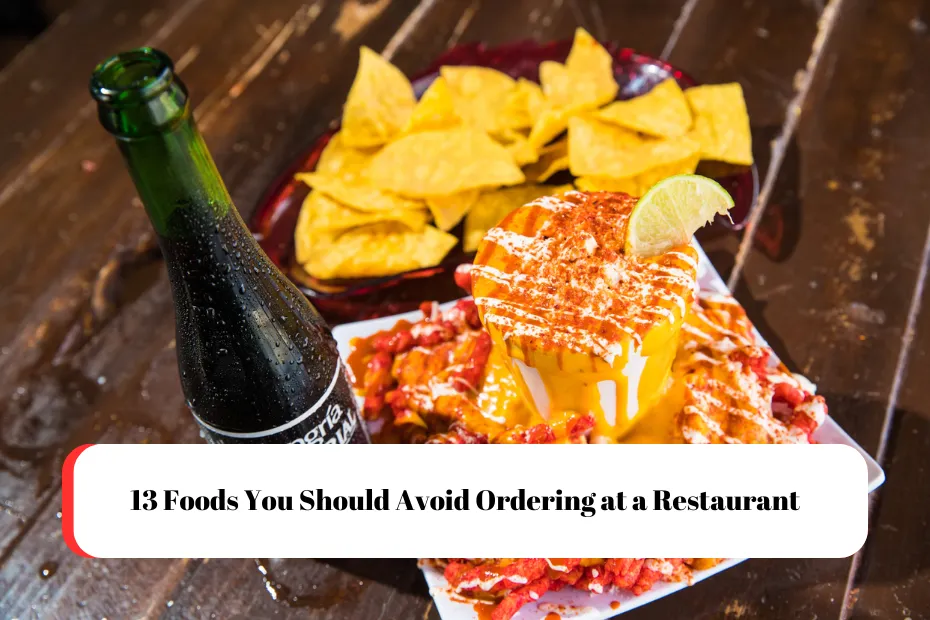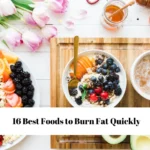Dining out is a treat we all enjoy, but not every menu item is worth the order. In fact, some dishes could put your health at risk or leave you feeling less than satisfied. Whether it’s the freshness of the ingredients, hidden calorie bombs, or improper handling, there are certain foods you should be cautious about when eating at a restaurant.
In this blog, we’ll explore the 13 foods you should avoid ordering at a restaurant, shedding light on potential health hazards, lack of nutritional value, and how you can make smarter choices when dining out. By understanding the risks associated with these common menu items, you can enjoy your meal knowing you’ve made a safe, delicious, and healthy choice. Keep reading to discover which dishes to skip next time you’re at a restaurant.
1. Raw Oysters
While raw oysters are considered a delicacy by many, they pose a significant health risk, especially if they are not properly handled. Oysters can carry harmful bacteria, such as Vibrio vulnificus, which can lead to severe illness or even death in extreme cases.
Oysters are filter feeders, meaning they absorb contaminants from the water, including pollution and toxins. Unless you are certain that the restaurant follows strict sourcing, handling, and storage practices, it’s better to skip raw oysters and opt for cooked seafood options.
2. Sushi from Non-Specialized Restaurants
Sushi requires meticulous preparation and handling due to the raw fish involved, and restaurants that do not specialize in Japanese cuisine may lack the expertise or proper food safety practices. Freshness is crucial, as even a slight lapse in temperature control can lead to foodborne illnesses like salmonella or listeria.
When ordering sushi, it’s best to go to an established, specialized restaurant where the chefs are trained in preparing sushi safely and ensure the ingredients are fresh.
3. Salads with Pre-Made Dressings
Salads are often perceived as a healthy choice, but the dressings used in restaurants are often loaded with sugar, unhealthy fats, and preservatives, especially if they are pre-made. Many restaurants opt for commercial dressings to save time, and these are typically high in calories and sodium.
Additionally, salads that sit for too long with dressing can become soggy and lose their nutritional value. If you’re health-conscious, it’s a good idea to request olive oil and vinegar on the side or skip the dressing altogether.
4. Fish on Mondays
According to many chefs, ordering fish on a Monday is risky because seafood deliveries generally arrive later in the week. This means that the fish you order at the beginning of the week may not be as fresh as you’d like, possibly sitting around since the weekend.
Fish is highly perishable, and improper storage or extended time in the refrigerator can cause it to spoil quickly. If you’re dining out on a Monday, it might be best to opt for other protein options like chicken or beef.
5. Daily Specials
Daily specials can seem appealing due to their uniqueness and lower prices, but they are often made with ingredients that the restaurant needs to use up before they spoil. While some daily specials are genuinely creative, others may involve items that are on the verge of expiring.
This can affect both the taste and safety of the dish. Unless you are at a reputable establishment where the special is clearly something new and fresh, it may be best to stick with the regular menu.
6. Buffet Items
Buffets are known for their variety and all-you-can-eat appeal, but the nature of buffet service poses numerous health risks. Food left out for long periods can become breeding grounds for bacteria, especially if proper temperature control is not maintained.
Additionally, buffets often recycle dishes, replenishing them throughout the day, which increases the chance of contamination. Cross-contamination is also a risk, as serving utensils may be used for multiple dishes, spreading germs or allergens.
7. Iceberg Lettuce
While iceberg lettuce is a common base for many salads, it is one of the least nutritious greens available. It contains little fiber and minimal vitamins compared to darker leafy greens like spinach or kale. Moreover, lettuce is frequently linked to foodborne illness outbreaks, particularly E. coli, as it is difficult to clean properly.
In restaurants, where handling large quantities of vegetables is necessary, the chances of contamination increase. Opt for salads with more nutrient-dense greens for a healthier option.
8. Chicken Caesar Salad
Chicken Caesar salad may seem like a healthy option, but it often comes loaded with unhealthy ingredients. The dressing is typically high in calories, fat, and sodium, especially if it’s pre-made or bottled. Additionally, many restaurants use processed or pre-cooked chicken that can be high in preservatives and low in flavor.
The croutons are usually fried and add extra calories, and the salad itself might lack the variety of vegetables necessary for a truly nutritious meal. If you’re watching your calorie intake, it’s better to build your own salad with lean protein and lighter dressing.
9. Well-Done Steak
While steak can be a delicious indulgence, ordering it well-done can ruin both its flavor and texture. Cooking steak to this degree causes it to lose its natural juices, resulting in a tough and chewy piece of meat.
Additionally, some restaurants may use lower-quality cuts of beef for well-done orders since the longer cooking time can mask imperfections. If you enjoy steak, it’s best to order it medium-rare to medium to preserve the meat’s flavor and tenderness.
10. Hollandaise Sauce
Hollandaise sauce, a creamy topping often served with eggs Benedict, is notoriously tricky to prepare and is a hotbed for bacteria if mishandled. The sauce is made from egg yolks, butter, and lemon juice or vinegar, which, if not kept at the right temperature, can lead to food poisoning.
Restaurants that prepare hollandaise in large batches might leave it sitting out for extended periods, increasing the risk of contamination. If you’re craving eggs Benedict, consider asking for a lighter sauce or skipping it altogether.
11. Nachos with Processed Cheese
Nachos are a popular appetizer, but when topped with processed cheese, they become a calorie-laden, nutritionally void dish. Processed cheese lacks the nutrients found in natural cheese and is often high in sodium and preservatives.
Additionally, the chips used in nachos are usually fried and heavily salted, adding to the unhealthy nature of this dish. If you’re craving nachos, look for versions made with fresh ingredients like real cheese, guacamole, and salsa.
12. Eggs in an Unfamiliar Restaurant
Ordering eggs at an unfamiliar restaurant can be risky due to potential mishandling. Eggs are a common source of foodborne illnesses, particularly salmonella, and they need to be cooked and stored at the correct temperatures to prevent contamination.
If you’re at a restaurant you don’t know well, it may be better to skip egg dishes unless you can see that the kitchen follows stringent food safety standards.
13. Tap Water in Certain Regions
While tap water is safe in many places, certain regions or restaurants may not have the best filtration systems, which can affect the taste and safety of the water. In some areas, tap water can carry contaminants or have a high mineral content that may not agree with everyone.
If you’re in a location where you’re unsure about the water quality, it’s safer to opt for bottled water or other beverages that you know are handled more carefully.
Conclusion
Knowing which dishes to avoid can make your dining experience safer and more enjoyable. Whether it’s avoiding raw seafood, heavily processed foods, or poorly handled ingredients, being mindful of your choices helps protect your health.
Next time you’re looking over a restaurant menu, remember these 13 foods you should avoid ordering at a restaurant and opt for safer, fresher alternatives. Making informed decisions ensures a better meal and peace of mind.
FAQs
Q1: Why should I avoid raw oysters at a restaurant?
Raw oysters may carry harmful bacteria and toxins, which can cause foodborne illnesses if not properly handled.
Q2: Are daily specials a good choice at restaurants?
Daily specials can sometimes be made with ingredients that are nearing expiration, so it’s best to be cautious unless you’re at a reputable establishment.




